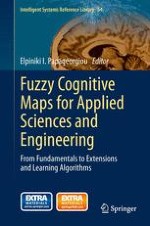2014 | OriginalPaper | Buchkapitel
6. Decision Making by Rule-Based Fuzzy Cognitive Maps: An Approach to Implement Student-Centered Education
verfasst von : A. Peña-Ayala, J. H. Sossa-Azuela
Erschienen in: Fuzzy Cognitive Maps for Applied Sciences and Engineering
Verlag: Springer Berlin Heidelberg
Aktivieren Sie unsere intelligente Suche, um passende Fachinhalte oder Patente zu finden.
Wählen Sie Textabschnitte aus um mit Künstlicher Intelligenz passenden Patente zu finden. powered by
Markieren Sie Textabschnitte, um KI-gestützt weitere passende Inhalte zu finden. powered by
